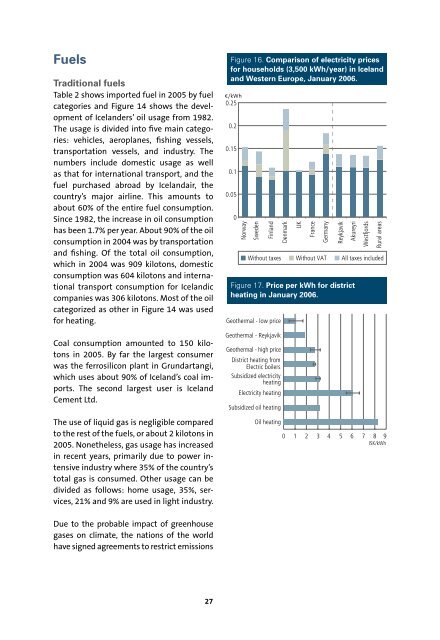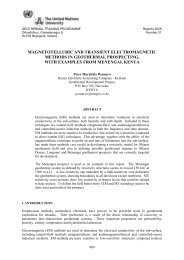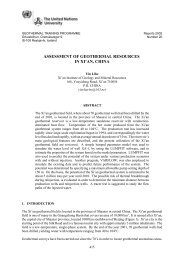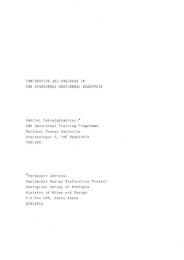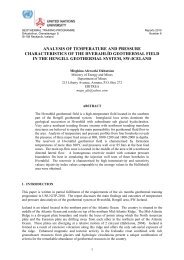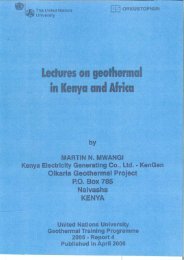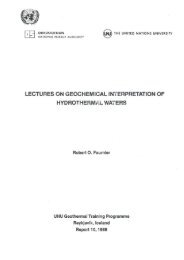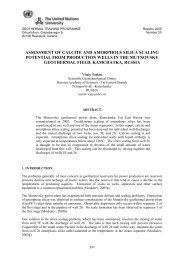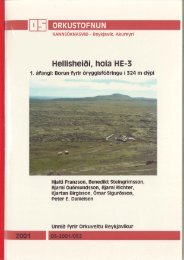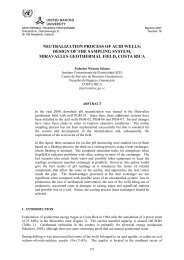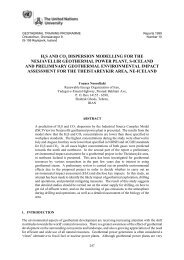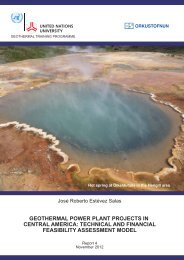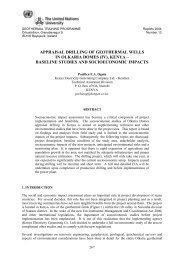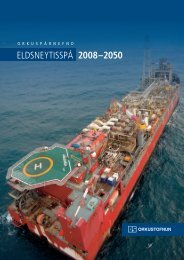In 1970, the first year that the ISAL plant was operating at full capacity, Iceland’spower intensive industry consumed almost half of all electricity produced. Thatsame year, the diatomite plant Kisilidjan hf. was established to process diatomitefrom the lakebed of Lake Myvatn. Access to a steady supply of geothermal energymade the plant internationally competitive. In 1975, the Icelandic government, incooperation with some other governments, established Icelandic Alloys Ltd. (Islenskajarnblendifelagid), a ferrosilicon plant. In 1999 the plant was expanded, and annualproduction increased from 70,000 to 115,000 tons.Efforts to increase the power intensive industry during the 1980s were unsuccessful,especially due to a depressed aluminum market. It was not until 1995 that themarket began to improve, and move in the direction of developing further energyintensiveindustrial projects. Since 1995, this development has been rapid.Construction of the Nordic Aluminum plant (Nordural) at Grundartangi, WestIceland, started in 1997, and the plant went online in 1998. The plant was commissionedby Columbia Ventures Corporation but Century Aluminum bought Nordic Aluminumin 2004. Initially, the plant produced 60,000 tons annually. In a second phase,which became operational in 2001, the plant was expanded and its annual productioncapacity increased to 90,000 tons. Further expansion in 2006 will increase theannual production capacity to 220,000 tons. In 1997, an expansion of the ISAL plantin Straumsvik was also completed, and the annual production capacity of that plantbrought to 162,000 tons.Demand for electricity needed to support power intensive industry has grown substantially,and decisions have been made to greatly increase aluminum production inIceland during the first decade of the 21st century. This includes the construction ofan aluminum plant in Reydarfjordur with an annual production capacity of approximately322,000 tons, as well as the expansion of Nordic Aluminum at Grundartangito produce as much as 300,000 tons. Further expansion of the Alcan plant to produce200,000 tons annually is also under consideration.House heatingsubsidiesElectricity for residential heating has been subsidizedby the state and energy enterprises since 1982. Thepurpose is to equalize the cost of residential spaceheating throughout Iceland. The main requirement to receive a subsidy is when a buildingis considered a residential dwelling and if utilization of geothermal energy is eitherimpossible or uneconomical.26
FuelsTraditional fuelsTable 2 shows imported fuel in 2005 by fuelcategories and Figure 14 shows the developmentof Icelanders’ oil usage from 1982.The usage is divided into five main categories:vehicles, aeroplanes, fishing vessels,transportation vessels, and industry. Thenumbers include domestic usage as wellas that for international transport, and thefuel purchased abroad by Icelandair, thecountry’s major airline. This amounts toabout 60% of the entire fuel consumption.Since 1982, the increase in oil consumptionhas been 1.7% per year. About 90% of the oilconsumption in 2004 was by transportationand fishing. Of the total oil consumption,which in 2004 was 909 kilotons, domesticconsumption was 604 kilotons and internationaltransport consumption for Icelandiccompanies was 306 kilotons. Most of the oilcategorized as other in Figure 14 was usedfor heating.Figure 16. Comparison of electricity pricesfor households (3,500 kWh/year) in Icelandand Western Europe, January 2006.Figure 17. Price per kWh for districtheating in January 2006.Coal consumption amounted to 150 kilotonsin 2005. By far the largest consumerwas the ferrosilicon plant in Grundartangi,which uses about 90% of Iceland’s coal imports.The second largest user is IcelandCement Ltd.The use of liquid gas is negligible comparedto the rest of the fuels, or about 2 kilotons in2005. Nonetheless, gas usage has increasedin recent years, primarily due to power intensiveindustry where 35% of the country’stotal gas is consumed. Other usage can bedivided as follows: home usage, 35%, services,21% and 9% are used in light industry.Due to the probable impact of greenhousegases on climate, the nations of the worldhave signed agreements to restrict emissions27


